
Career Wisdom from Women in Public Relations
What Women in PR Really Want You to Know About Professional Success I was once given an award for perseverance as a child and the sentiment has stayed with me. The ability to keep trying my best even when it’s challenging is deeply ingrained. It’s been a quality that’s served me well so I hold no hesitation in sharing that advice with others. So, in honour of Women’s History Month, I wondered what other women in PR would offer as career advice. Here’s what my wonderful colleagues had to say:

Passion for media coverage and current events
Graduating with a degree in Law and Politics I was deeply unsure about which path lay ahead of me. However, I was certain it wasn’t a postgrad in Law. With a deep passion for media coverage of global and domestic news and being an avid pig skin chaser, catcher, thrower and kicker, due to my kiwi roots; I knew I had to wedge myself with my legal and political knowledge into the world of communications, whilst also periodically running round a grass field.
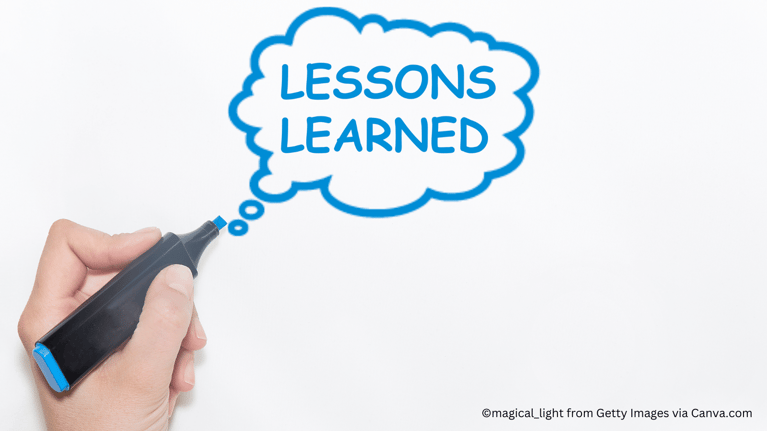
5 Vital lessons for sustaining a successful career in PR
You could assume that it’s easier today than it ever has been to create a successful career in a marcomms or PR role. After all, there’s more media to engage with – a greater variety of outlets and formats to explore, self-promotion platforms, and that’s not to mention the numerous tools, technologies to act as support systems to help you on your way.
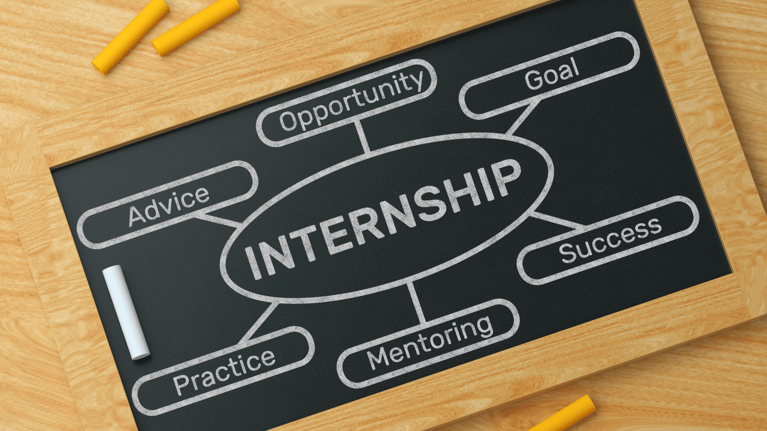
BlueSky Internship
A little about me I’m currently knee-deep in my MSc digital marketing programme at the University of Exeter. For over three years, I’ve been immersed in the world of content writing, social media marketing, and brand strategy. My heart has always been drawn to the power of words and the art of storytelling.

Thomas Willis - Classics to PR
As I neared the end of a PhD in Classics and English literature at University College London, I began to plan my next move. While I enjoyed the solo research that comprised my doctoral work, years tucked away in old libraries left me seeking a career more imbricated in the world.

BlueSky Thinking Internship Review
When I started my Journalism course at Kingston University, I thought I'd end up in the typical journalist role – you know; writing for a newspaper or for broadcast, or maybe even trying my hand at documentaries. But, to my surprise, one of my first experiences of working in the media found me in a public relations internship instead. During my degree, I covered all sorts of topics; from British politics to sports and even fashion. I’ve learned to be flexible. But exploring the world of business education? Well, that was never really on my mind. A new challenge Taking on the BlueSky Thinking internship gave me the opportunity to get to grips with the academic research of some very smart professors scattered all over Europe, turning their expertise into conversational, impactful and engaging feature pieces for the website. I was tasked with writing one piece each day, and I must admit it felt daunting at first as I had never written so many pieces in a two-week stretch before. However, the opportunity to acquire such a valuable skill was too good to turn down, and I embraced the challenge wholeheartedly. I was given creative freedom and was even encouraged to add personality to my pieces. This explains why I have littered my pieces with pop-culture references such as “Black Mirror” and “The Russell Howard Hour”. The power of curiosity Back at university, lecturers hammered into our heads that journalists need to be curious. To be walking encyclopaedias, knowing a little bit about everything. And you know what? Working with those research papers gave me the opportunity to expand my knowledge in ways I never knew I could. Suddenly, I could speak in depth about Ireland's startup scene or how robots are taking over industries. One goal that I set myself at the beginning of my second year was to get my first byline, and when I first achieved that with BlueSky, I was absolutely buzzing! Now flash-forwards a couple of weeks and I have a whole plethora of bylines and a body of work that will feature in my portfolio - which any journalism student will know, goes a very long way. I am extremely grateful for the opportunity to work alongside the team at BlueSky. Kerry, Stephanie, and Chloë were always there to ensure I was doing well during our calls. I would certainly recommend this internship to any aspiring communications or journalism student due to variety of transferrable skills you will receive. Personally it’s been a blast! Author: Plamedi Mbungu

Introducing Chloe Lane
At university I had the privilege of being taught by some brilliant lecturers. I opted to take some of the more obscure economics modules, such as The Economics of the Roman World which I loved every minute of. I also studied a few law modules and advanced statistics, as well as the more traditional micro and macroeconomics. Overall, a very mixed bag.

Introducing Georgina Tierney
I’m Georgina Tierney, I am a social science graduate from Dublin City University. I moved to London last year with the hopes of developing my career and experiencing life in a new city. I have always wanted to move abroad and after visiting London for the first time, my decision was made.
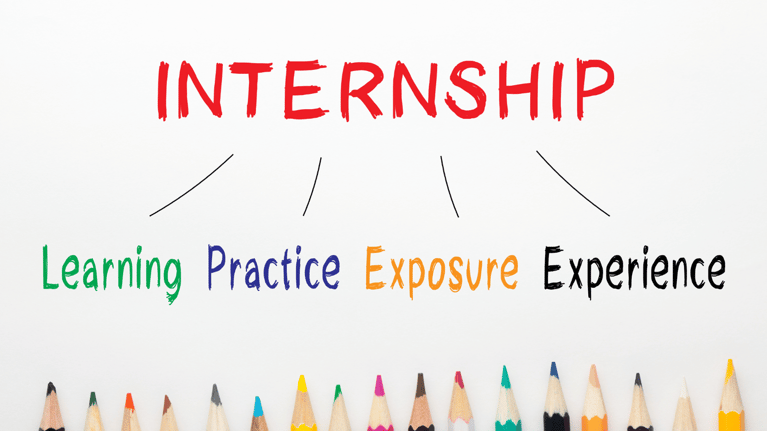
BlueSky Thinking Internship
Nearly three years ago, after much deliberation, I got set writing my personal statement to study journalism at the University of Sheffield. What's changed in me since then? Well the bottom line hasn’t; I like to both tell and read stories. Get it right and you have the ultimate tool to win people over or keep a conversation going, however big or small. I have always been an imaginative and inquisitive person, so this seemed like the best way to channel these qualities in a professional way. So as I reached the back end of my second year of my degree, time was short, and I feared the valuable experience I wanted on my CV was too. A short stint at a local paper in Sheffield certainly looked good on paper, but after one week I soon surmised that vox popping pedestrians on their favourite pubs was not my kind of journalism. I wanted to delve into issues closer to my heart, like climate change, technology and business innovation, which the likes of the Economist and the Financial Times cover. Needless to say, BlueSky Thinking's internship certainly caught my eye. It promised me the chance to do this, and a lot more. The internship offered two weeks of paid work, providing copywriting for ground-breaking researchers at business schools around the world. What's more, I’d have full editorial support on a daily basis and would be expected to produce a minimum of one publish-ready piece a day. It was a challenge I relished the thought of taking on. And the line which resonated with me so strongly: “The purpose of BlueSky Thinking is to break down the barriers between academic expertise and business practice.” It's like the company had carved my niche out for me. Published work with my name on it, and work I could be proud of at that. In two fortnightly stints I have written on AI, diversity in the workplace, new business strategies for the music industry and, alongside the academic rigour I have been able to put a bit of myself in as well. It will take some reading of my work to understand how I have weaved in terminator references and Frank Sinatra songs but I’ll let you see for yourself how I made it work! My portfolio of work for the site continues to build up and I can confidently say I have contributed to what I believe is a growing platform of vital importance. Perhaps the only hurdle of sorts was the more remote nature of work. I say this as a strong advocate of a divide between home and work when it's possible. However we are, of course, now a more hybrid working world than ever before, which I am happy to say was not a detriment to the quality of my work. On top of this I was made to feel extremely welcome by every member of staff I came across day in day out. I am very grateful for the multiple opportunities and access BlueSky has given me to insightful and thought provoking research and that they have allowed me the creative freedom to tell a witty, persuasive and informative story with it. With the skills, knowledge and insights the platform has given me I sincerely hope I have similar opportunities in the future to take on such great writing projects again. Author: James Dugdale

Why we offer internships – and why you should work with us!
“Why were you drawn to a career in Public Relations?
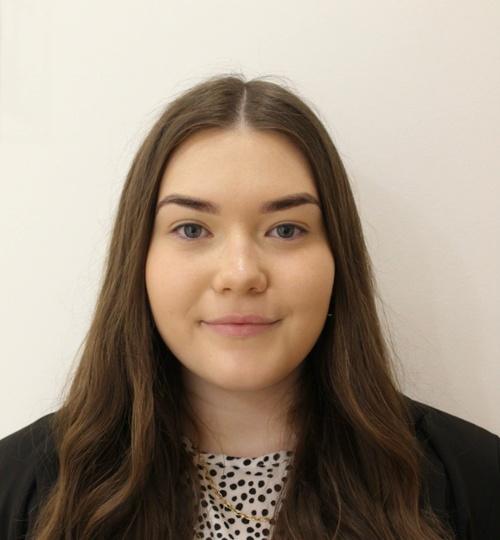
The ‘creative one’
I’ve always been known as creative. It’s a quality that’s part of my identity and has certainly allowed me to grow organically into my role joining BlueSky Education as a Social Media Executive.

Introducing Alexandre Lopez
I was certain my life would take me abroad – and I worked at every opportunity to go. When my university offered me a semester in Kazakhstan and another one in Hong Kong, I already had my suitcase packed. For a few years the university and education bubble allowed me to bounce between various locations and schools, and I loved every moment. Later on, I was teaching English as a second language when the Coronavirus pandemic hit, and lockdown began. Within 24 hours I had gone from interviewing for more permanent English teaching positions to frantically scrambling for a flight home to the UK.

Introducing Jamie Hose
I always felt sure a career in journalism was what waited for me after graduation. Having a degree in English Literature with Creative Writing from the University of East Anglia under my belt, it’s probably no surprise I love writing and telling stories. Aside from academic writing, during my time at university I threw myself into student journalism, broadcasting and copywriting. Any given day could see me switching between vastly different styles of writing and subject matter. I loved the variety and it kept me interested in every piece of work I took on, my career path therefore seemed clear.
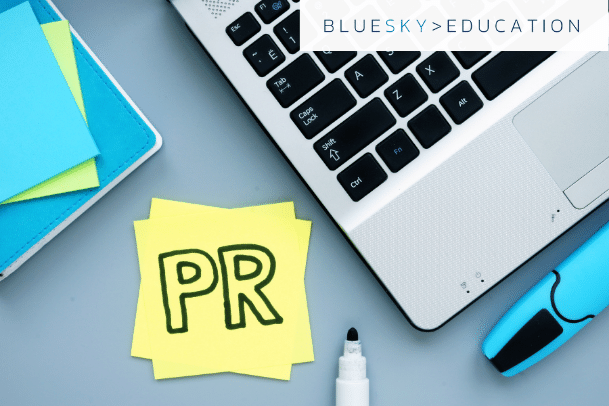
4 things about PR I wish I'd known earlier
What actually is public relations? This is the most common question asked to me when people find out what I do for a living. It’s ironic that the public relations industry could actually be terrible when it comes to its own PR.

Why you should follow your dream into PR
The key to career happiness is to follow your childhood dream, new research has revealed.

What a month in the BlueSky Education team has taught me about PR
I’ve been with the BlueSky education team for just over a month now, and it has been a learning experience to say the least. Coming straight out of university, in which I studied a pretty non-specific degree (History), I didn’t really know much about PR – especially Business School PR.

Introducing Jonny Stone
I’m Jonny Stone, and I’m leaving History in the past and looking forward to a new exciting career in public relations –
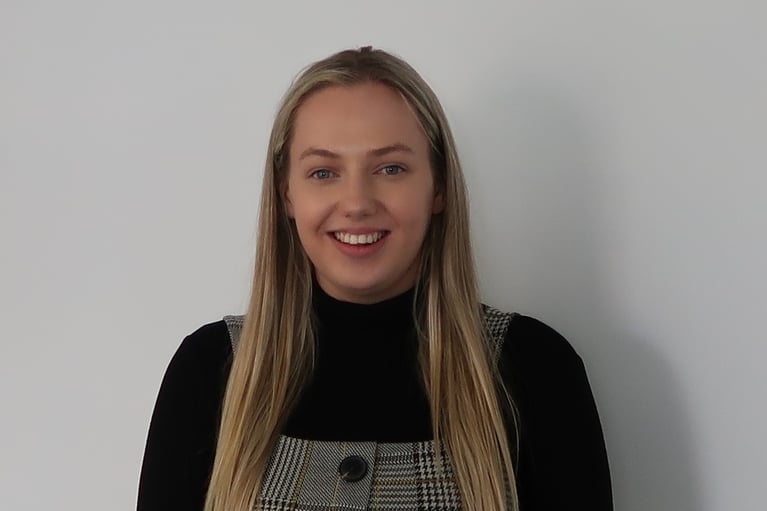
Journalism to PR
I was adamant when I was 18 that journalism was the career for me. I absolutely love writing and had a keen interest in current affairs and journalism combined these two.
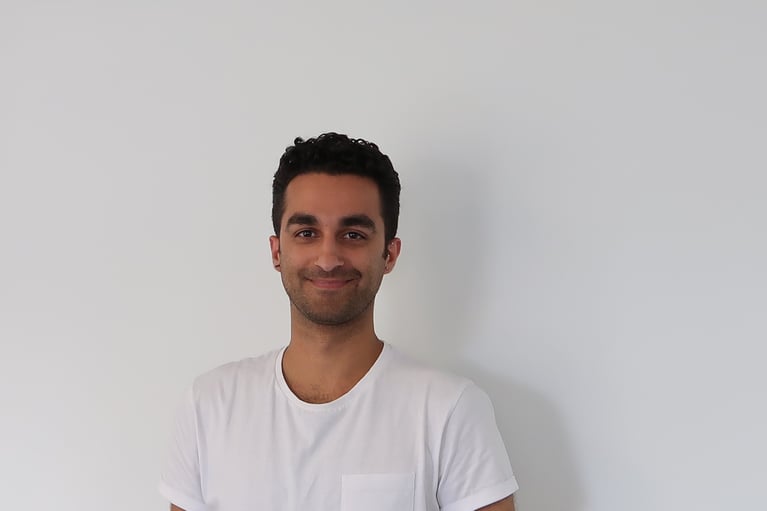
Introducing Kyle Grizzell
Since graduating, I have spun around in the world of recent graduate life as violently as I could have, frantically flitting from one career area to the next trying to find my ‘passion.’

Why you should address mental health in the workplace
In honour of mental health awareness week, we at BlueSky are keen to raise awareness around the common - but perhaps not as sufficiently discussed - issue of mental health at work - and why it’s vital that businesses today address this.

Introducing Olivia Nieberg
Having finished university with a degree in Politics & International Relations from the University of Manchester in 2015, my career path following graduation has been somewhat varied to say the least.
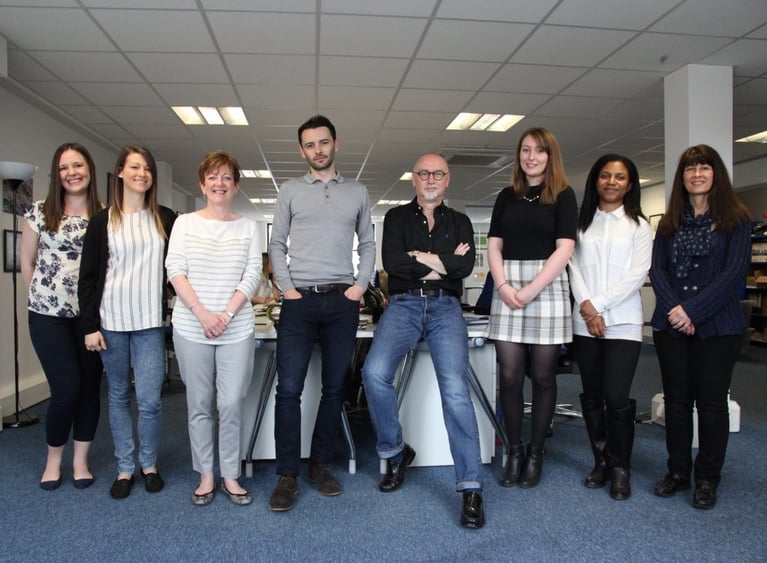
A look back at BlueSky Education in photos
As BlueSky Education approaches its tenth year, we take a look back at some of the greatest moments we’ve captured on camera in the last decade.

Does Feminism have a PR problem?
I am proud to call myself a feminist. And by feminist, I mean I believe in equality between genders – there’s no bra-burning, man-hating, tunnel vision going on here – just a simple desire for a level playing field.

How Generation Z will change the face of PR
As Russian tourists flock to Salisbury Cathedral and Theresa May accidentally summons ancient demons with her dance moves, the oldest Millennials begin to turn 40. It’s an absurd time to be alive.
Three Reasons I Chose a Career in PR
Okay so a career in public relations might not be as glamorous as Samantha Jones in Sex and the City makes out, however I’ve come to learn that there is so much more to PR than planning parties. Below I have summarised the top three reasons I love my job as a PR person.

The most annoying misconceptions about PR
Most people don’t understand what public relations is. Part of the problem is that it varies so much across different industries – from working in product PR and sending out samples, to organising huge launch events, to sticking your head inside a research paper and condensing it into a press release – it’s all PR. The purpose is pretty much always to promote something or someone, raise the profile, get seen, be talked about. To this day – and despite half a decade at this very agency – my parents still aren’t totally sure what I do. “The stereotypical “PR? Oh, so you just push out press releases then?” or the equally demeaning “PRs spend their time lunching, getting drunk and talking b*ll*cks” perspective,” is something that particularly irritates our Head of Practice, Kerry Ruffle. “Yes, PRs will distribute press releases, but it’s only a small part of a job which takes a great deal more creativity and forethought to do with any degree of success. “A press release, when written intelligently and used correctly,” she says, “is still an incredibly powerful tool. The problem is too many misinformed, time-pressed or plain lazy media professionals do not take the necessary time to write a release which considers who the intended audience is and what information would be most relevant to them, set it out clearly and concisely and, finally, actually send it to the right people!” As for going out and getting drunk all the time – if that’s true then we’re doing it wrong! Sophie O’Sullivan, Account Executive here at BlueSky, agrees. “A popular misconception is that PR provides a glamorous lifestyle consisting of no real work - only attending events and partying. Stereotypes like this have come into people’s consciousness because of characters such as Samantha Jones in Sex and the City, a PR who stated that, ‘’I don’t believe in the Republican party or the Democratic Party, I just believe in parties.’’ It's an opinion that’s rife among many of those who speak to our team. Kate Mowbray, Senior Account Executive, has had people think that she just goes to events and hands out free products to bribe journalists. Peter Remon, also a Senior Account Executive on the team, has had to battle the suggestion that PR is all about social media and he spends the whole day using Twitter. Really though? We spend our time interviewing fascinating alumni and pitching their stories of success, from setting up companies worth millions to changing whole industries. We dive into complicated research papers and craft short, sharp press releases. We arrange meetings with journalists all around the world, from Sydney to Singapore. We help target markets for student recruitment. We develop effective social media strategies. We offer expert advice on the business education landscape, and so much more.
How my degree prepared me for my role here at BlueSky PR
I studied English and Linguistics at Nottingham Trent University and my time at university is something I will never forget. Although cliché, I had an excellent time – growing both academically and personally throughout the three years. Although these subjects are certainly not a prerequisite for a career in PR, it does equip you with transferable skills which are key to being successful.
Is it cool to be kind in PR?
Hard-nosed, cut-throat consultants. Thick-skinned, full of false charm and selfish arrogance. Is that what you think of when you imagine a PR professional? Do you picture PR agency directors barking orders and waiting for hot coffee from shaking interns? I hope not because, personally, I think it’s rather cool to be kind in this industry. Perhaps it’s my Millennial attitudes surfacing. I’m all for doing good by people. I want to work for people who care about me and I want my colleagues – as well as my clients – to know I genuinely care about them. After all, I have only seen it produce positive results. If you know that you are valued and feel like you can make a difference to someone’s day, then you simply perform better. It’s about making that extra effort to pitch until there’s a ‘yes’, to research a country’s media until you understand it’s entire landscape, or to get up extra early to speak to someone in another time zone. Those are the actions of hardworking teams who want to achieve excellent outcomes – and it can be nurtured by kindness. By listening to everyone’s ideas, by creating a space where you don’t feel as though your job is on the line because the traffic was bad and you were five minutes late. Despite our sector’s somewhat harsh reputation, kindness is a feeling that’s woven into our culture here at BlueSky Education.
Our new intern: Sophie O'Sullivan
The inevitable question people ask when you tell them you’re studying for a degree in English and Linguistics is: ‘So, are you going to be a teacher?’

PR is an art, not a science
I’ve previously written on the reasons why I believe that PR professionals won’t be replaced by robots, and it seems that recent research from the Chartered Institute of Public Relations (CIPR) confirms my suspicions.
Kanye West, the connoisseur of disastrous PR
As one of the 51.9 million following Donald Trump on Twitter, his April exchange with Kanye West left me baffled – and not just at the meaning of ‘We are both dragon energy’.
How to build a perfectly performing PR team through personality
Are you demanding and competitive, or patient and relaxed? Cautious and formal, or sociable and enthusiastic? Even if they are opposites, all of these traits are positive – so bringing these personalities together can make the most impressively effective PR teams. But how can you do it in your own company? Take a look at ‘Insights Discovery’ to see how people have dominant characteristics. It’ll group personalities into Cool Blue, Fiery Red, Earth Green, and Sunshine Yellow. We are all unique combinations of these colours. This psychology tool helps to understand strengths and weaknesses, communication style, approach to problems, and value to the team. By building teams with people spread across these personality types, you’re more likely to create high-performing groups. While people don’t fit perfectly into a segment, it’s easy to see what traits they are lead by. I’d say that I was largely Fiery Red – being rather strong-willed and purposeful – with a good dose of both Sunshine Yellow and Earth Green. When I look at other members of the BlueSky team, it’s easy to pick up and admire Kerry’s Cool Blue characteristics of precision and logic, Peter’s Earth Green traits of patience and relaxation, and Kate’s Sunshine Yellow qualities of enthusiasm and spontaneity. Bringing these individual traits together here at BlueSky have built a strong, productive team. With our differences come rounded decisions, considerate teamwork, and a broad focus. While those of the team who lean towards Cool Blue might tend to focus on problem-solving, the Fiery Red workers look to results, Sunshine Yellow focuses on interactions, and Earth Green looks to maintain harmony. It’s simple to see why it works.

What would BlueSky PR study at business school?
Working with business schools on day-to-day basis, you learn about the incredible array of courses that they offer. With some specialisms like luxury attracting very different profiles to finance or perhaps entrepreneurship, I wondered what our team would be interested in studying.

The H&M nightmare
Unless you’ve been hidden under a rock for the past week you’ll have heard of H&M’s recent marketing campaign which saw a young black child wearing a hoodie which reads ‘coolest monkey in the jungle’. And in the days since the backlash has been huge – not only has the fashion brand lost celebrity endorsers, but huge swathes of customers have also pledged to boycott the business. The H&M fiasco is not the first time a global brand has come under fire for seemingly racist campaigns. It was only recently that Pepsi was widely criticised for its ad showing Kendall Jenner appearing to end racial tensions with a simple gesture – offering a can of Pepsi to a police officer! So what’s going wrong for these brands which have colossal marketing and PR teams behind them in order to prevent such disasters? Outrage marketing Many believe that what we are seeing is simply an example of outrage marketing – a deliberate campaign to anger people which creates a buzz around a particular brand. And if that was the intention it can’t be disputed that it has worked – the company has been trending online and everyone is talking about it. And while the general sentiment towards H&M is negative, the brand is certainly in the spotlight. It remains to be seen whether the saying ‘there’s no such thing as bad publicity’ rings true in this instance.

A new member of the BlueSky team: Kate Mowbray
Back to school I still remember how I felt when I went to big school for the first time.

A new member of the BlueSky team: Peter Remon
Starting a new job felt eerily similar to my first day at university The early starts, the meeting new people, the opportunity to learn new things. However, this time it was all without a fresher’s week before-hand sadly.

Buzzwords: The most productive meeting in the world
‘You know what will make our meeting more productive? Buzzwords!’ exclaimed the millennial, accustomed to throwing disruptive innovation around the boardroom. ‘Buzzwords??’ cried the Generation X, lean leadership guru as he planned his exit strategy. Tracey, MD of BlueSky PR, agreed with this 110%. She thought it was quite a unique idea. Not totally unique, you understand, just a bit. ‘Well let’s just be clear about one thing…” started Chris Johnson. But before he could finish his thought process, Kerry had shelved his discussion. ‘I think the really important point is that we touch base on how to leverage buzzwords to their best effect.’ ‘GAME-CHANGER!!’ cried Steph Mullins. She always overused that phrase. ‘This is hardly a game,’ commented Steph King, who instinctively distrusted ballpark figures. Ian wanted to contribute, but he had run so far up the flagpole that he was struggling to circle back. Adrian, the voice of reason, having to shout a little for Ian, chose this moment to ask a very valid question. It was a no-brainer, really. ‘So, at this moment in time, I just wanted to check that everyone is going forward. Because I’m not sure our diversity framework covers Time Lords.’ Over in the corner, Belinda was pouring herself a strong and stable drink.
A career in PR would be unsuccessful without….
Pinning down the exact qualities that make someone a success in PR is a hard task. Some bloggers don’t bother to delve deeper than the obvious; organised, good communicator, able to multitask. But I’m not sure that goes very far in demonstrating why you would be a great PR, rather than just a good employee, or the PR skills you have to offer. Then there are those who are oddly specific, or even philosophical about the task, perhaps romanticising their own qualities or copying directly from their own CV when they recommend that you are able to synchronise swim and own at least one Blue Peter badge. So what makes this list any closer to the truth? Well, I have decided to focus not on what will make you a successful PR, but what a career in PR would be unsuccessful without.
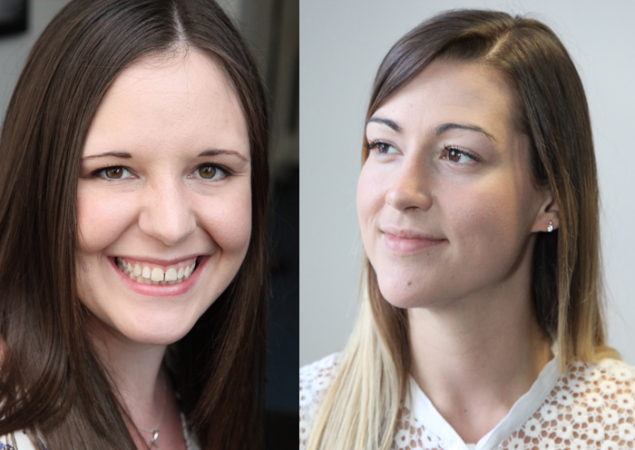
Why a journalism degree is helpful for a career in PR
What do you get out of a degree in journalism that’s most useful when starting your career in PR?
The LinkedIn message we all know about
You probably hadn’t heard the name Charlotte Proudman until this week. And if you still haven’t it’s a sure sign you don’t read the news – she’s been all over it following the apparent ‘sexist’ LinkedIn message she received from solicitor Alexander Carter-Silk. You may sense that I haven’t particularly warmed to her. So what are the facts and why has she got under my skin?
Why we work more
In 1930, economist John Maynard Keynes predicted that by now, we would only be working 15 hours per week. Though, Keynes never said what we would do with all that leisure time. He was an aristocrat, he would probably want us to write poetry, dance and play the violin. Keynes once said “My only regret in life is that I didn’t drink more champagne”.
3 Personal PR Tips From a New Starter’s Perspective
There’s no perception you should be more aware of than your own. All it takes is Googling a name to get an insight into your character or about seven seconds on average in person before someone has summed up a judgement of your character. Having joined BlueSky PR this week it’s fair to say making a strong first impression has been something of a priority, as it would be for any new starter! These three tips are yet to fail me when in the pursuit of creating a positive perception: Awareness of Your Online Image Have you ever Googled yourself? If not then you should probably open a new tab and do that now, it really is that essential! It’s now a given that your potential employers may do some online research to find out aspects of your life that your CV may not discuss. This doesn’t have to be a negative thing, in fact there’s a great opportunity to use this to your advantage. For example my LinkedIn profile is currently being used and abused to showcase any past activities that may be of interest in a professional context. I have a First Class Bachelor of Arts Honours Degree, just over a year’s worth of experience in the communications field and also work with a charity supporting women in male-dominated industries. These are aspects of my life I’ve made a point of being visible online to help shape a positive perception.
What degree do I need to get into PR?
Which degree is best for a career in PR? There’s no definitive answer. The PR industry benefits from variety – BlueSky PR certainly does! Languages, humanities, social sciences. We’ve graduated from an array of subjects, and our diverse experiences have all helped us in our careers. Take BlueSky’s Natalie Bishop who graduated from the University of Sheffield in English and Philosophy. She says her degree taught her there are always alternative ways of phrasing something. This helps Natalie in PR today, like Steph King, Head of Recruitment Practice at BlueSky, who learnt how to express things clearly and concisely from her Bachelors in Politics from the University of Warwick. “I also learnt a fair amount about drinking,” she said, “something that many people think is a prerequisite of working in PR. Sadly the days of taking journalists for boozy lunches are a thing of the past… in most cases anyway!” Regardless of topic, prioritise communication skills Going from student seminars to working lunches, Bruce Callander, who graduated from Newcastle University in Sociology and Politics, said: “You need to be able to communicate effectively in PR, obviously. Most of my course was seminar based and having regular discussions and debates helped to develop my communication skills. “Generally, I think you need to like learning about things and taking on knowledge – though I’m not sure if that can be taught!” As well as Bruce and graduates from the likes of politics and philosophy, BlueSky counts journalism, law and business alumni in its ranks too. Ian Hawkings, Head of Education Practice at BlueSky, holds a degree in Business and Management with Finance. He says: “I learned about business from a variety of perspectives, but where it has helped me in PR is to be able to see the business case for PR – and how it fits into a company’s overall strategy. This is helpful when working with clients to identify how they could use PR and communications to hit their strategic targets.” What about a degree in Public Relations?
5 business and HR lessons from Game of Thrones – WARNING: CONTAINS SPOILERS
I’ve recently started watching Game of Thrones after months of being told how good it was, how much I’d like it and how much I was missing out on by not being a regular viewer. Well, everyone was right – it’s amazing. Any fans don’t need me to tell them that the combination of power struggles, violence and dragons is practically unmatched on TV. However, while developing an unhealthy fascination with the series, I’ve also noticed a few key lessons that all businesses could learn from. Build strong pipelines – Nobody liked Joffrey but at least he held King’s Landing together. He may have been utterly loathsome, evil, tyrannical and plain awful, but he did at least carry himself like royalty. However, his replacement Tommen is nothing like that and is, frankly, a poor excuse for a King. Can you really imagine him organising a defence against a siege or charging into battle? The Lannister family didn’t necessarily have a choice, but businesses do, and failing to build effective pipelines leads to poor leadership succession. We all know what happened to Apple and Disney after their leaders initially departed and the same thing could be happening to the house of Lannister, which is currently teetering on the brink. Surround yourself with good people – You may think you can run everything, but the truth is, to be successful you have to delegate and that means you have to trust those around you. Robb Stark (RIP) made that mistake and we all know what happened to him. Tywin thought he was surrounded by people he could rely on and ended up being slain on the toilet by his own son. And as a result of that, Cersei is now surrounded by a small council made up of in-laws and relics who can’t offer any valuable advice. If you want to be successful, you have to build a good team around you who can offer additional guidance and tell you when you’re heading down the wrong path.
The toughest interview questions and how to answer them
Last week, the media was hit with articles professing to know the “10 toughest interview questions” of all time, rendering offices everywhere pensive, interviewers inspired, and jobseekers mildly nauseous. We all like to think we’d be ready for any interview, poised, brimming with knowledge and somewhere on the spectrum of a highly caffeinated cross between Legally Blonde and Rain Man. So how do potential employers catch us off guard? How best to respond to questions designed to catch you out? And, when the going gets tough, “WWBSD?” What would BlueSky do?
Halloween horror stories
With it being Halloween it seemed to make sense to do this week’s blog on a relevant and often terrifying subject. That’s why I’ve asked the BlueSky team for their worst, scariest or weirdest interview or employment experiences: Tracey – “When I was in recruitment some of our interview rooms had sofas. One of my candidates was early so he was shown into the interview room to wait for me. When the allotted appointment time arrived I entered to find him fast asleep. I thought he had passed out but it turned out he just had the mother of all hangovers. He was actually a good candidate and later secured a role, but he wasn’t exactly firing on all cylinders that morning”. Vickie – “I once went to an interview where the interviewer discovered he hadn’t booked a meeting room and they were all full. As a result, we ended up having the meeting in the only room available – a storage cupboard! After 20 minutes perched on a box of paper in a very small windowless room, I felt highly embarrassed leaving the cupboard to many amused looks from the rest of the staff. I can only imagine what they thought!” Kerry – “Not long after I left university, I applied for a job online as a ‘copywriter’ at what was described as a new local publication in my home town. I was invited to interview, and attended on three separate occasions because the first two times I showed up the boss had forgotten he was meeting me. When I finally sat down with him in a dingy room of a rundown office block, he spent the first 15 minutes talking about himself and his wonderful hugely successful career. He then went on to tell me I’d actually be cold-calling for ad sales for a publication that was little more than a glorified monthly newsletter. I’d be paid per ad placement, but wouldn’t be paid for the first month whilst I learned how to use the phone… I made my excuses and left.” Steph M –
Gender diversity: Let's talk about progress
It’s been an interesting week for British women. Not only has the Church of England voted to allow women to become bishops for the first time in its history, David Cameron’s reshuffle has doubled the number of women in Cabinet to eight. This has seen an influx of articles that insist progress is forging new pathways like never before, yet others that argue change is still desperately needed and, in a way, they’re both right. Which isn’t surprising when you consider that gender equality is a topic that remains high on the news agenda – inextricably connected to issues of diversity and leadership – and that’s why the headlines this week were littered with “women bishops” and “women MPs”. Headlines like these simply won’t stop being front page news while female representation remains so low. Essentially, the issue here stems from the lack of women in leadership.
What to expect from your first job interview
Last week my sister, who is still a student, walked into an interview room for a summer job – she was completely terrified. She rang me up to say she had got the role. It came as a surprise – I could hear it in her voice, as she said she could not answer some of the questions that had been posed. I guess we all have moments of self-doubt and perhaps the younger and less experienced we are the more we feel the stress of a job interview. But sometimes we’re good! And we should own it! Perhaps all job interviews are just as important but the real clincher is the first interview into your future career. The job you dream of doing and becoming exceptionally good at. You want to get that one right, leave an impression and make sure you get the call with an offer. I have read numerous blog posts claiming that the majority of first interviews are unsuccessful for various reasons. So I was also curious to find out how the first job interviews went for the amazing people I share an office with, and what advice they would give to someone attending their first interview. Tracey Barrett ‘’ My first job interview was for Bejam, the frozen food retailer (now Iceland), as a management trainee in 1983. The interviewer asked me to sell them the ashtray sitting on the desk (yes you could smoke in the office in those days). I threw it out of the window and said “You haven’t got an ashtray have you?” I got the job! ‘’ Ian Hawkings ‘’ My first proper job interview was for a well-known recruitment firm- they did a standard interview for about 30 mins and then took me onto the sales floor, gave me a bunch of CVs and made me cold-call candidates….while they watched and listened. It was terrifying. ’’ Kerry Gill ‘’ The most entertaining story I could tell you about would be from one of my first interviews after graduating. I’d applied for a position advertised as a “Content Writer” at a local newspaper. After submitting my CV, a cover letter and a few examples of my work, I was invited for an interview at the office. When I turned up, I realised the office was two rooms above a pub on the high street… not a very encouraging start! When I walked inside, the place was in complete disarray. The walls looked grubby, some of the ceiling tiles were missing, it didn’t smell great and there was stuff everywhere. The staff were all my age and paid me no attention at all when I arrived. When finally someone did notice me I introduced myself and said I was there for an interview. After a few blank looks the girl gave me a scrap of paper (ripped from another person’s CV) to write my mobile number on as the boss wasn’t there. She told me to come back later, not giving a specific time. ‘’ Foolishly, I did go back. I actually met the boss this time. He guided me into his office (a small room with bare walls, a disproportionately large desk, a chair and a small plastic coffee table strewn with books) sat down and proceeded to tell me that I was going to flog ad space over the phone for unheard of local newspapers all around the Midlands. Cold calling for minimum wage, with an unpaid trial period to “test my abilities”. Needless to say I turned down the job offer when it came two weeks later! '' Stephanie Mullins’ first real interview was similar to mine; we both interviewed for the company we work for now. We both have some good stories to tell but perhaps some other time. For all it’s worth, I would advise you to expect something different in your interview – I sure didn’t and it took me by surprise. When Adrian Barrett interviewed me, one of the questions was: ‘’what country had lost a war but came out of it wealthier than when it joined?’’ My reaction: straight face. My answer: ‘’In all honesty, warfare is not one of my strongest points.’’ (By this time I was wondering whether I was still being interviewed for a PR role). But I was able to mention some of the ongoing wars and I proved that I had some knowledge of the war related news stories. I understand the role of that question now.
Is PR to blame for the Monday blues?
Rush hour traffic, an overflowing inbox and the working week ahead. Yes, it’s Monday again. But did you know, you might hate Monday because of a PR stunt? ‘Blue Monday’ was a name given to a date in January to be the most depressing day of the year – and it was all part of a publicity campaign. It was included in a press release by the public relations agency appointed by Sky Travel. My colleague, Alex Dobocan, said: “Blue Monday came about as a PR stunt but it seems to have had success and made us all regard Mondays as… well, depressing. “Whilst we all dread endings and we could agree they are never all that pleasant, when it comes to ending a week we are more excited than anything! So why are we not treating Monday as any other start? - An exciting time to make things happen, to plan and to conquer.” Monday: the day we love to hate Taking this positive attitude, and inspired by a paragraph on Tumblr, I’d like to tell you a little more about these Mondays that we love to hate.
Forget the internship, bring on the returnship
As a woman who took a relatively lengthy career break to care for my children, I was interested to learn about the launch of a new scheme by Credit Suisse in London to help senior professional women re-start their careers after taking time out of the workplace. Dubbed the “returnship”, the Real Returns programme is the first UK example of an idea which has been gathering pace in the US over the last few years. The scheme involves returners taking on CV-worthy projects that draw on their existing skills and experience and being paid accordingly. It’s effectively putting a toe back in the water of the corporate world, allowing women - who have perhaps lost confidence in their abilities - the opportunity to prove that they’ve still got what it takes to succeed and that it is actually possible to juggle corporate life and a family. 70% of women fear taking a career break This story really struck a chord with me personally, as believe me, when you’ve been out of the corporate world for a good few years, the prospect of going back is a daunting one indeed. Once you’ve jumped off the train, it’s very hard to jump back on. In fact, a recent survey from London Business School shows 70% of women fear taking a career break. Nagging doubts about whether you can still do your job, whether you’ll be up to speed with new technology and how you’ll combine a working day with the working day you usually put in as the primary carer are more than enough to put you off even looking for a role. Female brain drain I know of far too many professional women –experienced, bright, capable and very well-organised – who have never returned to work after having a family. Not only is this a great loss to the professional world and the wider economy, but it’s also a personal loss for these ladies. All of that brain power, time invested in studying - in most cases for a degree or professional qualification – not to mention years spent climbing the career ladder, potentially sidelined for a future of domestic drudgery or a low-paid job for which they are massively over-qualified!
